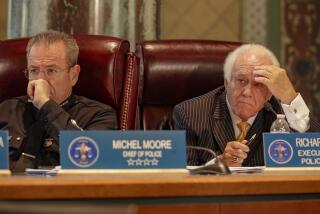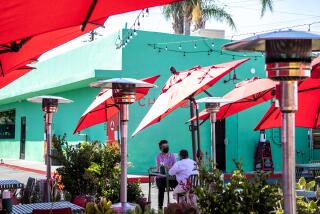City Extends Limits on Liquor Outlets in South-Central L.A.
- Share via
In the midst of statewide debate over whether restrictions on liquor stores should be eased, the Los Angeles City Council on Wednesday backed tighter controls, extending a tough zoning ordinance aimed at limiting the number of liquor outlets in South-Central Los Angeles.
The extension of the ordinance, first passed by the council in 1984, was a victory for the South-Central Organizing Committee, a church-based community organization seeking to stem the proliferation of liquor stores in the black community. “Some of these liquor stores are Club Meds for criminals,” committee member Mildred Snipes said Wednesday before the council vote. “The loitering, the drinking, the drug activity that has been allowed to breed around liquor stores has got to be stopped and that’s why we need the ordinance.”
The council’s 12-0 vote, continuing the ordinance in force for another year, was a setback for liquor and convenience store owners who say the restrictive law unfairly singles out their industry. Operators of convenience stores and mini-marts that sell beer and wine, complaining that they are being lumped together with problem stores, are fighting back by pushing state legislation to override local laws. A provision of a bill introduced by state Sen. Ken Maddy (R-Fresno) and scheduled for a Senate committee hearing May 6 in Sacramento could knock down local zoning ordinances like the one extended by the council.
The one-year extension by the council means that those who want to open stores that sell liquor within a 75-square-mile South-Central area will have to apply for a conditional-use permit before receiving a state liquor license. The permit is granted by the city only after Planning Commission hearings and a determination that the proposed new store or changes in an existing store will pose no harm to the community.
In addition, under the ordinance some owners of existing businesses could be required to improve lighting, close earlier, hire security guards and abide by other conditions. The South-Central area already has more than 1,000 liquor stores--more than the total number of liquor stores registered in each of 34 states, according to City Atty. James K. Hahn.
But the toughest survival test for the conditional-use permit may lie ahead--in the outcome of a lawsuit between the city and Payton’s Deli and Liquor, a South-Central liquor store that is fighting the ordinance. A previous lawsuit by the Southern California Retail Dealers Assn. failed to overturn the ordinance. But the Payton case is the first time an owner of an established outlet is challenging the ordinance as unconstitutional, and a plaintiff’s attorney indicates that although he “hopes it doesn’t come to that,” he will take the case “all the way” if necessary.
“I see it as a battle between people who naturally want quiet enjoyment and their neighborhood safe and a guy who paid honest money for his business and just wants to be left alone to do it,” said Arthur P. Song Jr., attorney for Payton’s owners.
But according to the South-Central Organizing Committee, the story of Payton’s is the story of too many liquor stores in South-Central Los Angeles--open drug dealing, assault, drunkenness, loitering, public urination, prostitution and two murders in the immediate vicinity of the store, according to police testimony in court documents.
Owners, while not necessarily defending Payton’s specifically, say the store is going through the same problems they could face. The merchants complain of government red tape, which they say is encouraged by whipped-up community activists who blame them for a deteriorating neighborhood. Most liquor stores, said Shirley Ford, owner of two liquor stores and head of an owners’ association, sell more than alcohol. She said they sell some groceries and other household necessities over a large area left abandoned after the flames of Watts left their mark throughout South-Central in the summer of 1965.
The basic conflict between community residents and liquor stores, a relationship that has been alternately close and antagonistic, was illustrated last month when the organizing committee staged a “shopping trip” to Payton’s. Frustrated with what they saw as the store owner’s unwillingness to apply for a conditional-use permit that could permanently change the store hours and other conditions, a group of 300 South-Central Organizing Committee members descended upon the store. As a reporter watched, they circulated around the small store, asking the clerk about prices, sugar content of food, usually buying nothing and, when they did, paying in pennies. The group also complained that day about food on the shelves dated two years ago, and this led to a county health department investigation soon to be handed over to the city attorney’s office, a health department spokeswoman said.
Welfare Checks
The March 15 hourlong protest action tied up the store on a day when many people cash welfare checks there, leading to complaints from other community residents not allied with the committee. “People are trying to cash their checks,” shouted an irritated John Davis, 16. “Where else are they supposed to go? We need this store here,” he said, noting that the closest supermarket is more than a mile away.
“If someone’s doing drugs out here in front of the store, that’s not the store’s fault. That’s stupid,” Davis said.
Whatever the view of the ordinance, there is no doubt that it has had an effect on the number of applications for liquor licenses in the South-Central area. From May, 1983, to April, 1984, before the law, there were 95 applications to sell beer and wine in liquor and convenience stores or markets, according to John Thompson of the state Department of Alcohol and Beverage Control. In the first year after the ordinance passed, there were only 27 such applications, he said.
Distinction Drawn
Sister Diane Donaghue, a Roman Catholic nun and South-Central Organizing Committee member, said the city ordinance does not always cause problems between store owners and the group. “There are many success stories, several stores that have been asked to clean up their act and they have,” she said. “We’re not anti-liquor, we’re anti-crime.”
More to Read
Sign up for Essential California
The most important California stories and recommendations in your inbox every morning.
You may occasionally receive promotional content from the Los Angeles Times.













